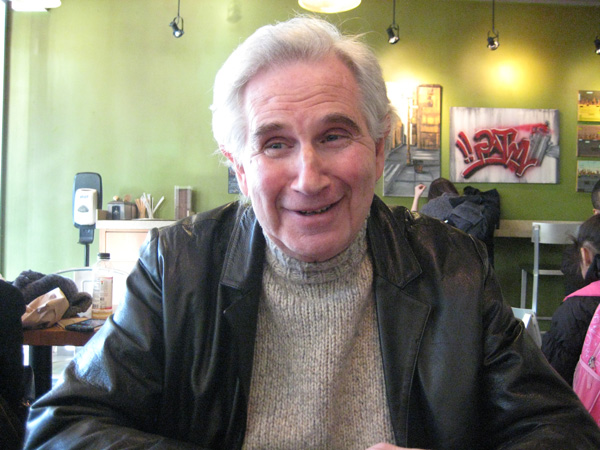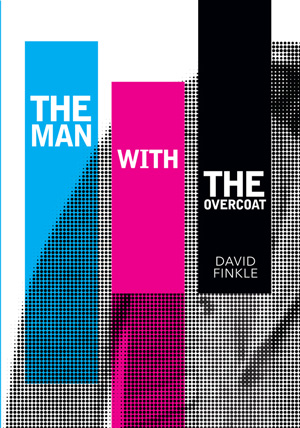
BY DUSICA SUE MALESEVIC | Longtime Chelsea resident David Finkle did not have a choice when it came to writing his new novel “The Man With the Overcoat” — the germ of the idea came to him in his sleep.
“I didn’t decide to write a novel,” he said with a laugh.
“I had a dream, which is now the first couple pages of the novel. When I woke up from the dream, I thought, ‘Hmm, there’s something there. I think I can do something with that.’ ”
In the dream, he is standing in front of a bank of elevators in what seemed like a Fifth Avenue office building, but not necessarily to board one, Finkle explained. It is the end of the workday and the first man to get off the elevator is in a business suit and carrying a briefcase. As he exits he passes another man, dressed similarly, whose holds out an overcoat. The man passing takes the overcoat.
The man who takes the proffered overcoat becomes the book’s protagonist, Skip Gerber, Finkle told Chelsea Now during a meeting at Brooklyn Bagel & Coffee Company (Eighth Ave. btw. 24th & 25th Sts.).
Finkle started to write about Gerber to find out who he was and discovered that he was a real estate lawyer, who “kept following his nose and clues” to return the overcoat.
He had written 20 pages when he realized that the story would all take place in 24 hours. During his overcoat odyssey, Gerber bumps into and meets many other characters. Finkle said the characters fascinated him — they just cropped up and spoke.
While this may be Finkle’s first novel, he is no novice writer — he has written about the arts for several outlets for decades, including the Huffington Post and the Village Voice, and published a short story collection, “People Tell Me Things.”
Growing up in Trenton, New Jersey, Finkle loved books. He went to Andover and then studied literature at Yale. He took a writing course with Robert Penn Warren, who wrote the Pulitzer-winning “All the King’s Men,” and who encouraged Finkle to send his short story around to editors.
He moved to New York City and got his first big break: a job for a trade magazine about the music business called “Music Vendor” in 1962. After going to the Army Reserves, his job was waiting for him when he returned. But change was afoot at the magazine, which was bought by two men from another trade magazine called “Cashbox.” (“Cashbox” was second only to “Billboard” at the time, noted Finkle.
The magazine got a new name: “Record World.” Finkle said that the ’60s were probably “the best, most exciting decade for music. I was in a position to cover music during a very important and exciting time. I went to everything and I met everybody.”
Finkle was at Shea Stadium when the Beatles played, Carnegie Hall for the Rolling Stones, met Janis Joplin and reviewed every record that came out — except for country — for the next decade.
Finkle had his own musical interests and ambitions as well. While at Andover, he met Bill Weeden and they would become writing partners and a nightclub act. They toured the country, but Finkle ultimately went back to journalism.
Now focused mainly on theater, Finkle says that he goes to five or six performances a week and sees around 250 to 300 shows a year. He also reviews cabaret and books when he can.
“It means I don’t get to movies as much as I’d like,” he said. “But that’s what I came to New York to do. I’m one of the lucky ones.”
Finkle said he always knew he wanted to live in New York. He rented in several neighborhoods before deciding that he wanted to buy. After looking awhile, he said the nicest thing he saw was in Chelsea.
“I don’t see myself leaving Chelsea,” said Finkle, who moved to the neighborhood in June 1985.
He lives on W. 20th St., which he called wonderful, and recalled some of his famous neighbors like artist Louise Bourgeois, whom he would exchange pleasantries with in French.
“I’m a big stoop sitter,” he explained. “I was brought up sitting on stoops on the wrong side of the tracks in Trenton, New Jersey. We had a wonderful stoop.”
He is often on his stoop — people ask for directions to the High Line or stop and chat on their way to or from the Atlantic Theater.
Finkle also loves that much of the art world is in Chelsea and he often goes to galleries in between writing projects. When he comes back, his “gears have been changed.” He did, however, lament the adult bookstores on Eighth Ave. between 20th and 21st Sts.
Art has informed some of his short stories. In “Rembrandt paints again,” the famous Dutch painter comes into the life of someone in New York City temporarily, he said. In turn, that story triggered another collection that Finkle recently sent his agent: a famous dead person comes back to help the narrator solve a problem.
Titled “Great Dates with Some Late Greats,” Finkle explained that it has a unifying theme, and the first and last stories are told by the person who compiles the rest of the tales.
It was daunting to start writing fiction, he said, because for a long time he felt he couldn’t be as good as his literary idols Marcel Proust, William Faulkner, Philip Roth and John Cheever. Eventually, he found his voice and began writing short stories in the late ’80s.
“Stories just kept coming to me and I kept writing,” he said.
David Finkle’s “The Man With the Overcoat” was released by Nth Position Press in April, 2015. For more info on the author, visit davidfinkle.com.




































